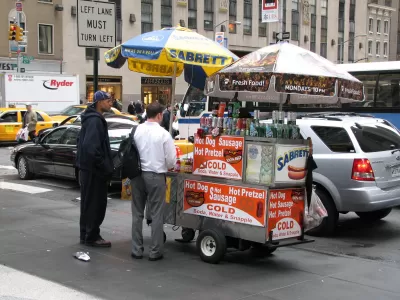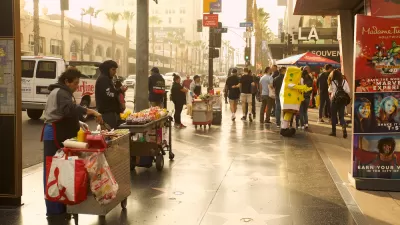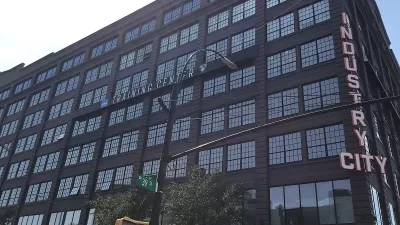Despite operating on public right-of-way, food vendors claim that developers are pushing them out of established vending spots.

New York's street vendors are mounting a campaign against displacement by real estate interests, writes Valeria Ricciulli in Curbed. "It is time that the real estate industry stopped running our city and controlling our public space," says Mohamed Attia, executive director of the Street Vendor Project.
Hot dog vendor Mohamed Awad has watched his business in the Hudson Yards get slowly eaten away by real estate interests. When Hudson Yards opened in 2019, "Awad, his partners, and their employees began to face harassment from the police and Hudson Yards security, even though their carts are on a public sidewalk." To make matters worse, property owner Related has added landscaping elements that the vendors see as a purposeful attempt to "push them out of Hudson Yards altogether." Awad explained that since "city regulations explicitly require vendors to leave a 12-foot-wide clear path on the sidewalk in front of their carts," the landscaping additions "effectively built him out of business."
"After their rally, several street vendors took it upon themselves to push back, literally. The Street Vendor Project had found that Related didn’t have a DOT permit to set out that planter. So several street vendors worked together to shove it just far enough to make room for Awad’s cart, as Hudson Yards employees and several NYPD officers stood by."
Days later, the planter had been moved back. Awad is undeterred. "I’ve been here before all of them," he said. "It doesn’t mean I own [the space], but this is a public street. I’m not going to give up."
FULL STORY: Hudson Yards Has Landscaped Out the Food Vendors

Maui's Vacation Rental Debate Turns Ugly
Verbal attacks, misinformation campaigns and fistfights plague a high-stakes debate to convert thousands of vacation rentals into long-term housing.

Planetizen Federal Action Tracker
A weekly monitor of how Trump’s orders and actions are impacting planners and planning in America.

In Urban Planning, AI Prompting Could be the New Design Thinking
Creativity has long been key to great urban design. What if we see AI as our new creative partner?

Milwaukee Launches Vision Zero Plan
Seven years after the city signed its Complete Streets Policy, the city is doubling down on its efforts to eliminate traffic deaths.

Portland Raises Parking Fees to Pay for Street Maintenance
The city is struggling to bridge a massive budget gap at the Bureau of Transportation, which largely depleted its reserves during the Civd-19 pandemic.

Spokane Mayor Introduces Housing Reforms Package
Mayor Lisa Brown’s proposals include deferring or waiving some development fees to encourage more affordable housing development.
Urban Design for Planners 1: Software Tools
This six-course series explores essential urban design concepts using open source software and equips planners with the tools they need to participate fully in the urban design process.
Planning for Universal Design
Learn the tools for implementing Universal Design in planning regulations.
Gallatin County Department of Planning & Community Development
Heyer Gruel & Associates PA
JM Goldson LLC
City of Camden Redevelopment Agency
City of Astoria
Transportation Research & Education Center (TREC) at Portland State University
Jefferson Parish Government
Camden Redevelopment Agency
City of Claremont





























